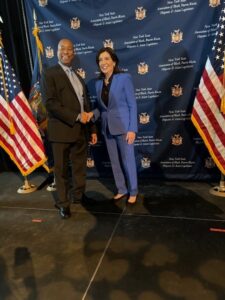Medgar Evers College associate professor named to prestigious board of directors

By David Gil de Rubio | dgilderubio@mec.cuny.edu
Gregorio Mayers, Esq. was recently named to the Brooklyn Bridge Park Corporation (BBPC) Board of Directors on September 11. Mayers, a tenured associate professor of Government and Law in the Department of Public Administration at Medgar Evers College, also serves as the school’s deputy chair and chair of the criminal justice concentration.
In addition, he is the College Ombudsman.
This recent appointment was made by Governor Kathy Hochul and given his history working in city government and deep legal background, the Brooklyn resident is more than qualified.
“I served two years and two terms as a senior advisor under Mayor Mike Bloomberg,” Mayers explained. “Last year, I was appointed to the New York City Parole Board to what is called the Local Conditional Release Commission. Given that I am a lawyer, my background teaching criminal law and all of my other community stuff, I was put on that board with five others.
“People at Rikers’ come before someone like myself and others on Fridays and I make the decision. My panel and I have a tough decision as to who shall be released from Riker’s island and who should say. It’s not easy.”
Chaired by Deputy Mayor for Operations Meera Joshi, the BBPC consists of a 17-member board of directors appointed by members of the corporation on the nomination of the Mayor of the City of New York, the Governor of New York State and local elected officials.
Following his appointment, Mayers has already attended two BBPC monthly meetings while being brought quickly up to speed with the issues the organization is currently addressing.
“I’m on the finance and audit team,” Mayers said. “The governor wanted me on there to bring my perspective and to look ahead and see how those projects are coming along. There is a skating rink, a pizza shop, multimillion-dollar hotels and a number of other businesses for the city’s tenants over by DUMBO.
“This is a development corporation, so we want to make sure that the state-funded part is okay in this private-public partnership. It’s a joint partnership between the state and the city, so we went right into business looking at the funding and approving the contracts. I had a little breakfast meeting with the finance committee letting me know what the numbers looked like. They didn’t want me voting on matters that I didn’t understand with the various concessions.”